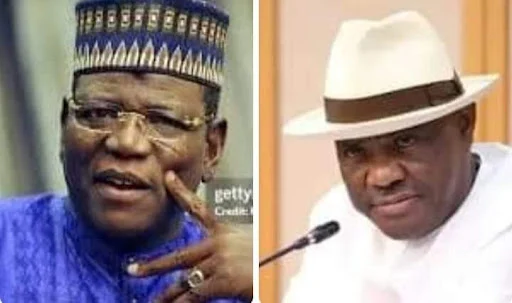Nyesome-Wike-Will-Be-A-Political-Orphan-To-Tinubu-And-Both-Of-Them-Are-Going-To-Lose - Sule-Lamido
Lamido Critiques PDP’s Prospects and Wike’s Role in Tinubu’s Administration
In a recent discussion reported by the Nigerian Tribune, Chief Sule Lamido, a respected figure in Nigerian politics, shared his perspectives on the current state and future of the People's Democratic Party (PDP) as the nation looks ahead to the 2027 general elections. Lamido, who served as both the governor of Jigawa State and Nigeria’s Minister of Foreign Affairs, is one of the founding members of the PDP and has been a consistent voice in shaping its policies and direction. His insights come at a critical time for the party, which is grappling with internal challenges and external pressures in its quest to reclaim power from the All Progressives Congress (APC), currently led by President Bola Tinubu.
As political activities intensify, speculations have arisen regarding the influence of Nyesom Wike, the newly appointed Minister of the Federal Capital Territory (FCT), on the PDP’s future. Wike, a key political figure with significant influence in Nigerian politics, has sparked debate with his continued membership in the PDP despite his new role in Tinubu’s APC-led administration. This unusual situation has led to widespread rumors that Wike may have been strategically placed to weaken the PDP from within, potentially providing a significant advantage to the APC in the lead-up to the 2027 elections.
Lamido, however, sought to dispel these speculations, asserting that Wike remains a loyal member of the PDP and that his position in Tinubu’s administration does not indicate a betrayal or a strategy to undermine the party. According to Lamido, Wike’s political trajectory has been shaped independently of Tinubu’s influence. He pointed out that Wike’s ascent in politics, which includes his roles as Special Adviser to former Rivers State Governor Peter Odili and Chief of Staff to former Governor Rotimi Amaechi, was driven by his commitment to the PDP rather than any external manipulation.
Lamido further elaborated on Wike’s rise to the governorship of Rivers State, emphasizing that his achievements and political standing were the result of his dedication to the principles and objectives of the PDP. He argued that Wike’s current role in Tinubu’s administration should not be misconstrued as a shift in allegiance or as evidence of a covert alliance with the APC aimed at destabilizing the PDP.
Despite his defense of Wike’s loyalty to the PDP, Lamido did not shy away from expressing his concerns about the broader implications of Wike’s involvement in an APC-led government. He suggested that both Wike and Tinubu might ultimately face political isolation as a result of their current alliance. Lamido described the alliance as “unprincipled,” asserting that it is contrary to Nigerian values and unlikely to yield long-term political benefits for either party. In his view, the lack of moral integrity and national interest in this alliance could lead to political downfall for both Wike and Tinubu.
Lamido’s critique reflects his broader concerns about the political landscape in Nigeria, where alliances are often formed based on personal interests rather than ideological alignment or a commitment to national development. He emphasized that for the PDP to succeed in the forthcoming elections, the party must remain united and committed to its founding principles. Any deviation from these principles, according to Lamido, could weaken the party’s chances of regaining power and diminish its role as a viable alternative to the APC.
Addressing the potential consequences of Wike’s position in Tinubu’s administration, Lamido expressed a bleak outlook for both Wike and Tinubu if they continue on their current path. He described Wike’s situation as precarious, warning that he could become a “political orphan” if his involvement in the APC-led government alienates him from the PDP. Lamido also suggested that Tinubu’s association with Wike could prove to be a liability, leading to political losses for both parties.
Lamido’s remarks underscore the complexities and challenges facing the PDP as it prepares for the 2027 general elections. The party, once Nigeria’s ruling party, has seen its influence wane in recent years due to internal divisions and the rise of the APC. For Lamido, the key to the PDP’s revival lies in its ability to remain united, uphold its values, and resist the temptation to form alliances that are not grounded in a commitment to the national interest.
In conclusion, Chief Sule Lamido’s reflections on the current political dynamics in Nigeria offer a sobering assessment of the challenges facing the PDP. His critique of the Wike-Tinubu alliance highlights the risks of prioritizing personal political gain over the collective good and the importance of maintaining the integrity and unity of the PDP as it seeks to regain power in 2027. As the political landscape continues to evolve, the PDP’s ability to navigate these challenges will be crucial in determining its future and its role in shaping Nigeria’s democracy





Comments